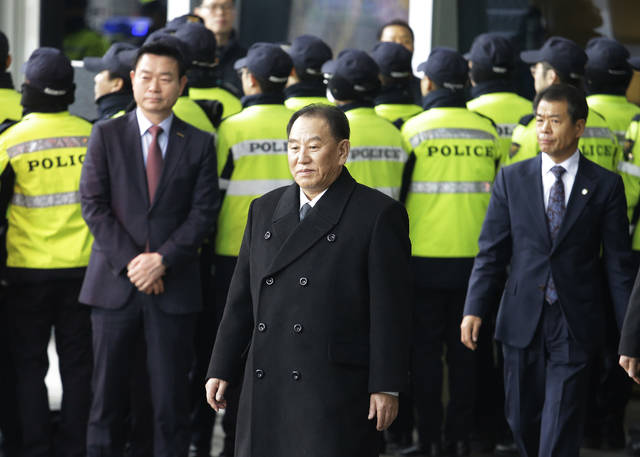North Korean delegation returns home after Olympics outreach

ASSOCIATED PRESS
Kim Yong Chol, center, vice chairman of North Korea’s ruling Workers’ Party Central Committee, left a hotel in Seoul, South Korea, on Tuesday.
SEOUL, South Korea >> North Korea’s delegation to the closing ceremony of the Winter Olympics left South Korea on Tuesday after a visit where the former general suspected of masterminding deadly 2010 military attacks told Seoul officials the North is willing to talk with Washington.
The delegation’s return home completes North Korea’s diplomatic outreach to the South during the Pyeongchang Olympics that was seen as an attempt to break out from the isolation and pressure North Korea faces over its nuclear program.
In a meeting with South Korean President Moon Jae-in shortly before the Olympic closing ceremony on Sunday, Kim Yong Chol, vice chairman of North Korea’s ruling Workers’ Party Central Committee, said the North has “ample intentions” for holding talks with the United States, Moon’s office said.
President Donald Trump responded to North Korea’s overture by saying that talks with North Korea will happen only “under the right conditions.”
“We want to talk only under the right conditions,” Trump said at a White House meeting with the nation’s governors on Monday. The administration’s position is that North Korea must get rid of its nuclear and missile programs before any talks can take place. The United States applied new sanctions Friday in an extension of what it calls a “maximum pressure campaign” to force North Korea to disarm.
The North sent the sister of ruler Kim Jong Un to the Feb. 9 opening ceremony as a special envoy. Kim Yo Jong told Moon in a luncheon at Seoul’s presidential palace the next day that her brother wishes to meet Moon in Pyongyang soon.
Don't miss out on what's happening!
Stay in touch with breaking news, as it happens, conveniently in your email inbox. It's FREE!
Seoul’s decision to allow Kim to visit trigged controversy because South Korea had accused him of being the mastermind of two attacks on the South that killed 50 people in 2010 when he headed the North’s Reconnaissance General Bureau.
Hundreds of protesters rallied outside the Olympic Stadium, holding signs like “Killer Kim Yong Chol go to hell,” while Kim attended Sunday’s closing ceremony with South Korean President Moon Jae-in and U.S. presidential adviser Ivanka Trump.
Several conservative lawmakers protested on a road near the inter-Korean land border on Tuesday, demanding Kim apologize over the attacks before leaving. Seoul’s Unification Minister Cho Myoung-gyon had breakfast with Kim and other North Korean officials earlier in the day, where they praised the Pyeongchang Olympics as a successful peace gesture, the ministry said.
Reviving inter-Korean dialogue is critical for the policies of Moon, a liberal who insists Seoul should be in control of international efforts to deal with North Korea’s nuclear weapons program.
But experts say arranging an inter-Korean summit would be difficult after a year in which the North conducted its most powerful nuclear test and flight-tested intercontinental ballistic missiles that could, when perfected, target the U.S. mainland.
South Korea may also need to persuade the United States and Japan, which are concerned North Korea is using its outreach to Seoul to relieve pressure over its nuclear programs.



